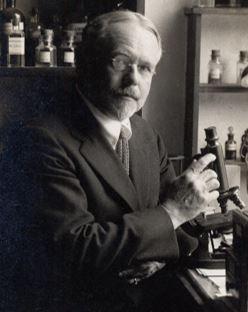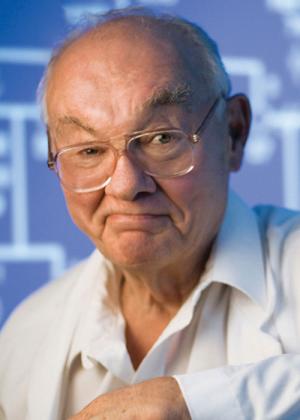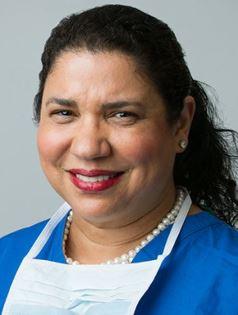Date Posted
More than a century after Aldred Scott Warthin, M.D., Ph.D., a pathologist at the University of Michigan, first suspected heredity lay behind one family’s numerous cancers, scientists have begun testing two experimental vaccines they hope will prevent or delay cancers associated with the inherited disorder Lynch syndrome.

Aldred Scott Warthin, M.D., Ph.D.
The history of “Family G,” as he called them, came to Dr. Warthin’s attention in 1895, and he studied them through much of the early 20th century. Multiple family members developed several different cancers, often at an early age, generation after generation. Many of the same cancers seen in this family now define Lynch syndrome, which raises the cancer risk for some 1.1 million Americans. For people with the syndrome, the lifetime risk of developing colorectal cancer alone runs as high as 70% to 80%. (Learn more about Dr. Warthin’s work.)
Individuals with Lynch syndrome may inherit genetic mistakes in five mismatch repair genes (MSH2, MLH1, MSH6, PMS2, and the EPCAM gene). As the “mismatch” description suggests, errors in any of these genes interfere with the body’s natural ability to repair DNA mistakes as cells divide to share genetic information. This leads to cumulative DNA damage that can cause cancer.
Mismatch repair errors play a role in about 15% of all colorectal cancers, although only about a third of them are in families with Lynch syndrome. One of the trial vaccines exploits the fact that defects in mismatch repair cause DNA to mutate frequently and generate new proteins.
Dr. Warthin is widely credited as the first physician to suspect a genetic component to cancer. But the idea ran counter to the prevailing notion at the time, and for many years afterwards, that factors in the environment caused most cancers. In the 1970s, that perception changed. The pioneering research of Henry Lynch, M.D., director and founder of the Hereditary Cancer Prevention Clinic at the Creighton University School of Medicine in Omaha, showed that indeed in some cancers, inheritance plays a powerful role in transforming healthy cells into malignant ones.
By tracking and documenting the cancer histories of more than 3,000 families, Dr. Lynch laid the groundwork for scientists’ molecular identification of the aberrant genes behind the disorder in the early 1990s. His work led to a name change for the syndrome, also called hereditary nonpolyposis colorectal cancer (HNPCC), to “Lynch syndrome,” honoring his contributions to understanding the role of heredity in this disorder.
Now, the first-ever preventive vaccine trials against inherited cancers are targeting cancers associated with the disorder that bears his name. Enrollment into these early studies started within the last year.

Henry Lynch, M.D.
Although the strategies of the two vaccine studies differ, both seek to prevent or delay cancer in individuals with Lynch syndrome or at high risk for the many cancers associated with it. The spectrum of disease includes cancers of the small bowel, stomach, upper urologic tract, ovary, biliary tract, and brain, as well as the more commonly observed colorectal and endometrial cancers.
While genetic testing can accurately detect Lynch syndrome, preventive options remain few. Individuals genetically predisposed to this inherited condition are primarily told to undergo frequent colonoscopy or risk-reduction surgery to remove precancerous lesions before they develop into cancers.
Recently, however, increasing evidence suggests that the common over-the-counter painkiller aspirin and other non-steroidal anti-inflammatory drugs (NSAIDs) like naproxen may reduce colorectal cancer risk in people with Lynch syndrome. Whether naproxen is superior to aspirin is still being evaluated. Initial aspirin studies had mixed results, with mice often faring better than their human counterparts. But new studies are investigating whether low-dose aspirin may lower bleeding risk and prove more effective for reducing cancer risk in this high-risk group.
NSAIDs are linked in a number of epidemiological studies to a protective anti-cancer effect. Scientists did not fully understand this process until the first randomized clinical trial on a third NSAID, celecoxib, was completed in 2004.
“With help from the ‘Lynch clan’ we were able to track molecular changes in some 1,400 genes in the healthy colon after treatment, which showed the beneficial impact of celecoxib,” said Luz Maria Rodríguez, M.D., who led the groundbreaking study with her colleagues in the Genetics Branch of the Center for Cancer Research at the National Cancer Institute.
Cosponsored by NCI’s Division of Cancer Prevention, the multi-center study found that celecoxib not only reduced inflammation in individuals at high risk for Lynch syndrome, it also specifically targeted COX-2, a key enzyme involved in carcinogenesis. Ever since, COX-2 has emerged as a major prevention target.

Luz Maria Rodríguez, M.D.
Additional NCI-sponsored studies have helped scientists better understand the molecular changes that occur when abnormal polyps in the colon turn malignant. One study, which pinpointed differing genetic patterns in the colon’s left and right sides, confirmed where cancers associated with Lynch syndrome first arise. Another study, that attracted renewed research attention, unraveled genetic changes in abnormal tissue from the colons of individuals with Lynch syndrome. These changes were later identified as the probable earliest signs of colorectal disease that leads to cancer. Other insights from the sequencing of cancers associated with Lynch syndrome through The Cancer Genome Atlas (TCGA) efforts identified tumor-associated antigens that are now the basis of one of the trial vaccines.
Genetic research advances hold promise for defining the precise cancer risk for those with Lynch syndrome, as well as for individuals who develop sporadic colorectal cancer, experts say. The current vaccine trials are expected to inform the next steps in vaccine development and may be beneficial to a far larger population in the future.
“We are all working for the same goal in translational science: to alleviate the pain and suffering caused by these cancers and so many others,” Dr. Rodriguez said.
To learn more about the ongoing clinical trials, visit their summaries on Clinicaltrials.gov, which include locations currently accepting participants:
